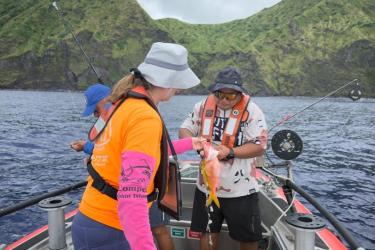About
NOAA Fisheries is excited to debut 7 low/no tech portable kits created to teach students (grades 6-8) about marine life in an interactive way. Each kit is free to borrow and includes:
- Lesson plans aligned to both the Hawaii Content and Performance Standards III and the national Ocean Literacy Principles.
- Background information that outlines science concepts, and student worksheets,
- Materials to present the lesson to a class of ∽30 students.
We value your feedback and strive to improve our education and outreach products. Each kit has an evaluation form via Google Forms that we will send you after you return the kit. We invite you to share student engagement, suggestions for improvement, and other feedback.
Make sure to let us know what you thought after using the kits.
Kit Descriptions
Marine Debris Project
Students will be able to identify marine debris (specifically derelict fishing gear) and its impact on the coral reef ecosystem in the Northwestern Hawaiian Islands. Students will participate in a simulation of collecting spatial data in the field, systematically walking a 5 x 5 meter plot and marking on a grid where debris is collected prompting the students to process and think about stewardship engagements that might help address these issues.
Fish Population Estimation
Students will be able to experience how scientists count fish populations on the reef through stationary point and towed diver simulations. Students will analyze why it is important to manage the population of fish stocks and increase their knowledge of ecosystem management and sustainability
Fish Life History
Students will be able to develop a basic understanding of the external and internal anatomy of bony fishes and deepen their understanding of why scientists study the age, growth, and reproduction. Students scientists will look at fish ear bones, called otoliths and count the growth rings to determine the age. Students will get a taste of accurately providing and recording biological data such as length and weight This information informs resource managers what size of fish is best to catch and ensures that fish will have the best chance to spawn and hopefully replenish our fish populations.
Marine Food Webs
Students will be introduced to marine food webs and basic ecological concepts that structure energy flow and animal interactions. Additionally, the lesson will acquaint students with ecological modeling and model limitations.
Marine Plankton
Students will be able to examine marine plankton and learn about phytoplankton (plant plankton) and zooplankton (animal plankton)Students will observe samples of holoplankton (animals that stay plankton for their entire lives) and meroplankton (animals that are plankton at one stage of their life, often the larval stage) especially those with hard shells that are vital to our seafood industry.Students will discover what may happen to plankton through ocean acidification and that will impact our food webs and our fisheries.
Hawaiian Monk Seal Crittercam
Students will be able to discuss different techniques and technologies that are used to understand the diet and feeding behavior of endangered monk seals. Students will collect data from swimming seals to make a logical, evidence driven argument that seals do not interfere with the fishing industry. Seeing through the eyes of this endangered species allows the students to connect and hopefully inspire these students to explore ways they can support recovery and improve their habitat.
Sustainable Recreational Fishing
Students will learn and practice casting a rod and reel; go "fishing;" log catch data; and learn about the importance of fishing and fisheries dependent data. We hope to inspire future scientists, possibly managers of these fish that we value here in Hawai’i.
Suitcase Science Kits
To request one of these kits, please fill out this form (hyperlink here) and we will do our best to support your classroom. Lesson plan pdfs also available upon request.
Email:pir.education.outreach@noaa.gov


